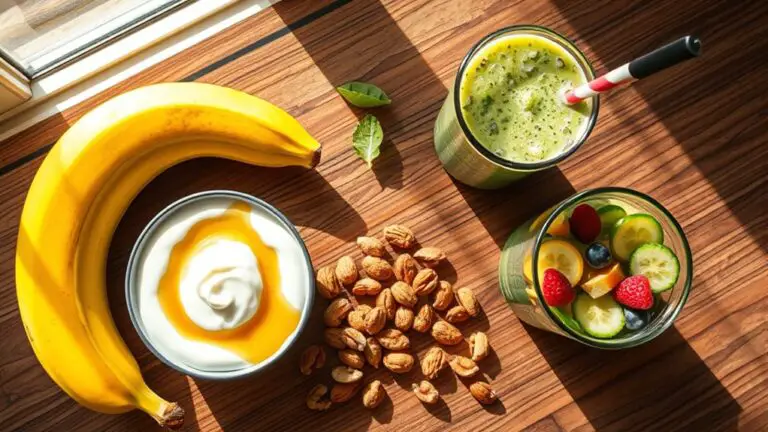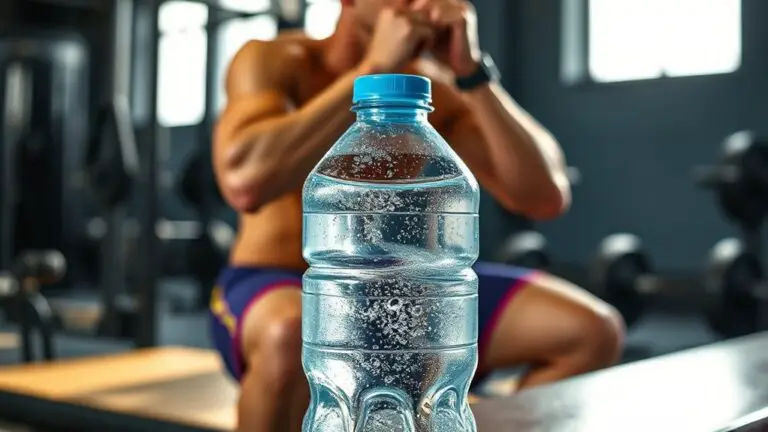How to Build a Muscle-Gaining Diet Plan
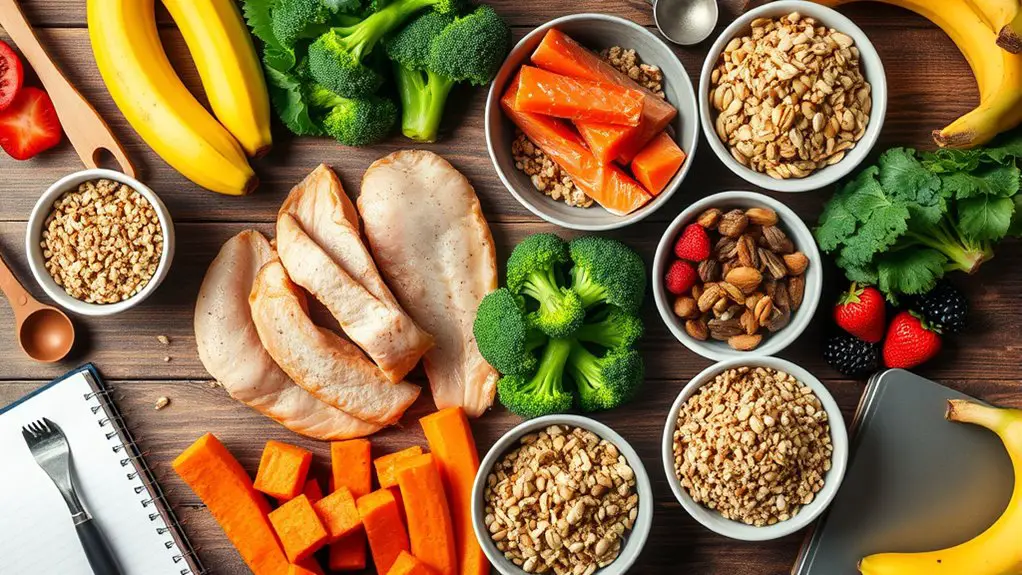
To build a muscle-gaining diet plan, focus on a balanced intake of macronutrients: 30% protein, 50% carbohydrates, and 20% fats. Calculate your caloric needs by determining your TDEE and aim for a surplus of 250 to 500 calories. Incorporate high-quality proteins and complex carbohydrates, and don’t forget healthy fats. Plan pre- and post-workout meals to optimize recovery and energy. With the right strategies, you can make significant progress in your muscle-building goals as you discover more.
Understanding Macronutrients
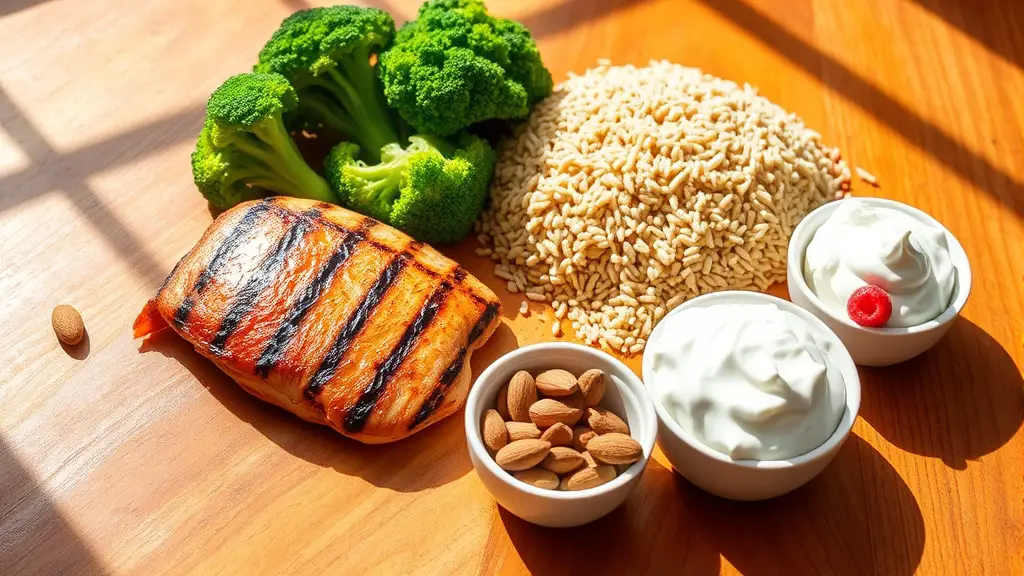
When it comes to building muscle, understanding macronutrients is crucial for crafting an effective diet plan. Macronutrients—proteins, carbohydrates, and fats—each play a crucial role in muscle growth and recovery. You’ll want to focus on macronutrient ratios that align with your fitness goals. A common recommendation for muscle gain is 30% protein, 50% carbohydrates, and 20% fats. Adjusting these ratios can optimize your performance and recovery.
To make dietary adjustments, track your food intake and verify you’re meeting your macronutrient targets. Incorporating lean proteins, complex carbs, and healthy fats will help fuel your workouts and support muscle repair. For instance, consider chicken, quinoa, and avocados as staple options. Remember, these ratios aren’t one-size-fits-all; you might need to tweak them based on your progress and energy levels. By prioritizing the right macronutrient balance, you’re setting yourself up for successful muscle gain.
Calculating Your Caloric Needs
How do you know how many calories you need to support muscle gain? First, you need to calculate your basal metabolic rate (BMR), which is the number of calories your body needs at rest. Then, factor in your activity level to find your total daily energy expenditure (TDEE). To gain muscle, aim for a caloric surplus—typically 250 to 500 calories above your TDEE.
Here’s a simple table to help you understand:
| Activity Level | BMR Multiplier | Example TDEE (2000 calories) |
|---|---|---|
| Sedentary | 1.2 | 2400 |
| Moderately Active | 1.55 | 3100 |
| Very Active | 1.9 | 3800 |
The Role of Protein in Muscle Growth
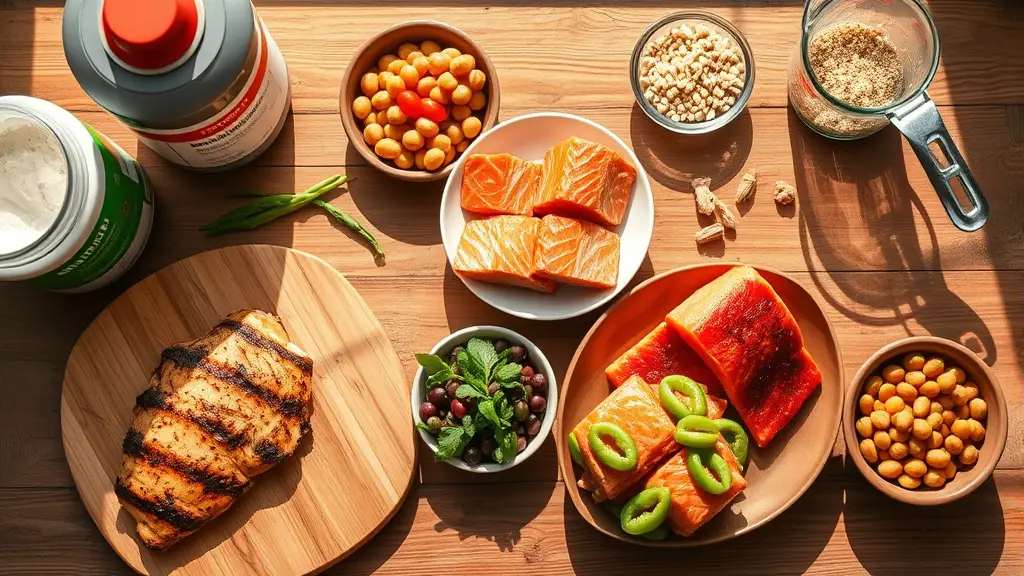
When it comes to building muscle, protein plays an essential role that you can’t afford to overlook. Timing your protein intake, choosing the right sources, and understanding your daily needs will greatly impact your progress. By focusing on these aspects, you can optimize your muscle growth effectively.
Importance of Protein Timing
While many factors contribute to muscle growth, the timing of your protein intake plays a crucial role in optimizing gains. Consuming protein within the anabolic window—about 30 minutes to two hours post-workout—enhances protein synthesis and aids in muscle repair. Your meal composition should focus on balancing protein distribution throughout the day, ideally targeting 20-30 grams per meal to maintain effective nutrient absorption. Additionally, your eating frequency should align with your workout intensity; more intense sessions may require increased protein intake. Proper digestion timing guarantees that your body has the necessary nutrients for efficient workout recovery. By strategically timing your protein intake, you can markedly enhance muscle repair and growth, ultimately leading to better overall results.
Protein Sources for Muscle
After understanding the importance of protein timing, it’s vital to evaluate the sources of protein that can support your muscle growth goals. Lean meats like chicken and turkey provide high-quality protein, important for muscle repair and growth. Dairy products, such as Greek yogurt and cottage cheese, offer not only protein but also calcium for bone health. Consider incorporating various fish varieties, rich in omega-3 fatty acids, to reduce inflammation. Plant proteins from legumes, nuts, and seeds are also beneficial, providing fiber and essential nutrients. For convenience, protein supplements can help you meet your daily intake, especially post-workout. Finally, egg whites serve as an excellent source of protein without excess fat, making them a versatile addition to your diet.
Recommended Daily Intake
To effectively support muscle growth, it is essential to understand how much protein you should be consuming daily. Generally, aim for 1.6 to 2.2 grams of protein per kilogram of body weight. This range helps optimize muscle repair and growth. To meet these needs, implement meal portioning strategies by distributing protein intake across your meals. For example, if you weigh 70 kg, target 112 to 154 grams of protein spread throughout the day. Don’t forget about daily calorie adjustments; make sure you’re in a slight surplus to fuel muscle gains. Tracking your intake can help you gauge progress and make necessary tweaks to your diet as you advance in your training. Consistency in both protein and overall calories is key to success.
Carbohydrates: Fuel for Performance
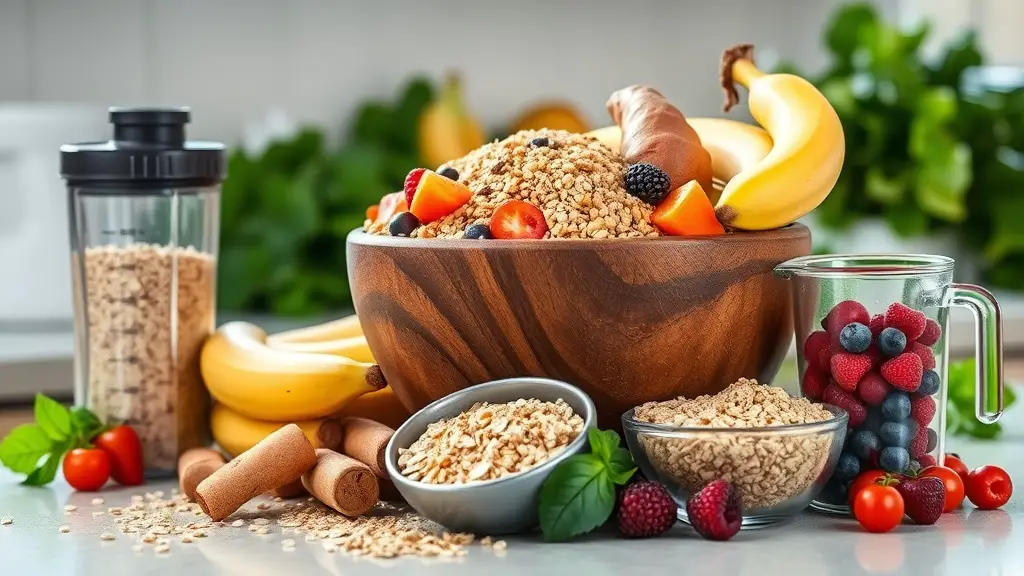
Carbohydrates serve as the primary source of energy for your workouts, fueling both endurance and performance. Understanding carbohydrate types and proper carbohydrate timing can greatly enhance your muscle-gaining diet. Here’s what you should know:
- Complex Carbs: Foods like oats, brown rice, and whole grains provide sustained energy.
- Simple Carbs: Quick sources like fruits and honey can be great for pre- or post-workout snacks.
- Timing Matters: Consuming carbs before workouts guarantees your glycogen stores are ideal, while post-workout intake aids recovery.
- Balance is Key: Pairing carbs with protein can maximize muscle synthesis.
Aim for a balance of both simple and complex carbohydrates throughout the day, especially around your training sessions. This strategy will help keep your energy levels high and support your muscle-building goals effectively. Remember, the right carbs at the right time can make all the difference in your performance.
Healthy Fats and Their Importance
While many focus solely on protein and carbohydrates for muscle gain, healthy fats play an important role in your overall diet and can greatly impact your muscle-building efforts. Incorporating healthy fat sources, like avocados, nuts, seeds, and olive oil, provides your body with essential fatty acids that support hormone production and nutrient absorption. These fats are significant for optimizing fat absorption of fat-soluble vitamins (A, D, E, K), which are important for muscle recovery and growth.
Additionally, healthy fats help maintain energy levels, allowing you to train harder and longer. They also reduce inflammation, which can enhance recovery. Aim to include a variety of these fat sources in your meals to guarantee you get a balanced intake. Remember, a diet rich in healthy fats not only supports muscle gain but also promotes overall health, making sure you stay strong and energized throughout your fitness journey.
Meal Timing and Frequency

Although many people underestimate the impact of meal timing and frequency on muscle gain, research shows that strategically scheduling your meals can greatly enhance your results. By focusing on meal frequency and nutrient timing, you can optimize your muscle-building potential. Here are some practical tips to contemplate:
- Eat every 3-4 hours: This helps maintain a steady supply of nutrients needed for muscle repair and growth.
- Prioritize protein: Aim for a protein-rich meal after workouts to maximize recovery and muscle synthesis.
- Don’t skip meals: Consistent meal patterns help regulate metabolism and prevent muscle loss.
- Consider carbohydrate timing: Consuming carbs around your workouts can replenish glycogen stores and fuel your next session.
Pre-Workout Nutrition Strategies
To maximize your workout performance, timing your pre-workout meal is vital. Ideally, you should eat a balanced meal containing carbohydrates and protein about 30 to 90 minutes before you exercise. This strategy guarantees your body has the energy it needs while promoting muscle repair and growth.
Optimal Meal Timing
When should you eat to maximize your workout performance and muscle gains? Timing your meals is vital for ideal nutrient absorption and muscle recovery. Aim to eat a balanced meal 1-3 hours before your workout. Here are some strategies to reflect on:
- Prioritize carbohydrates: They provide energy for your workout.
- Include protein: Helps with muscle repair and growth.
- Stay hydrated: Water is essential for overall performance.
- Adjust meal frequency: Eating smaller, more frequent meals can enhance nutrient absorption.
Key Nutrient Focus
As you prepare for your workout, focusing on key nutrients can greatly enhance your performance and muscle gains. Prioritize nutrient density by consuming complex carbohydrates like oats or sweet potatoes, which provide sustained energy. Pair these with lean proteins, such as chicken or Greek yogurt, to support muscle repair and growth. Don’t forget about healthy fats from sources like avocado or nuts; they help with hormone production and overall health. Maintaining a proper vitamin balance is essential, too—ensure you’re getting enough B vitamins for energy metabolism and vitamin C for recovery. Aim to fuel your body 30-60 minutes before exercising, allowing time for digestion. This strategic approach sets you up for a successful workout and maximizes your gains.
Post-Workout Recovery Meals
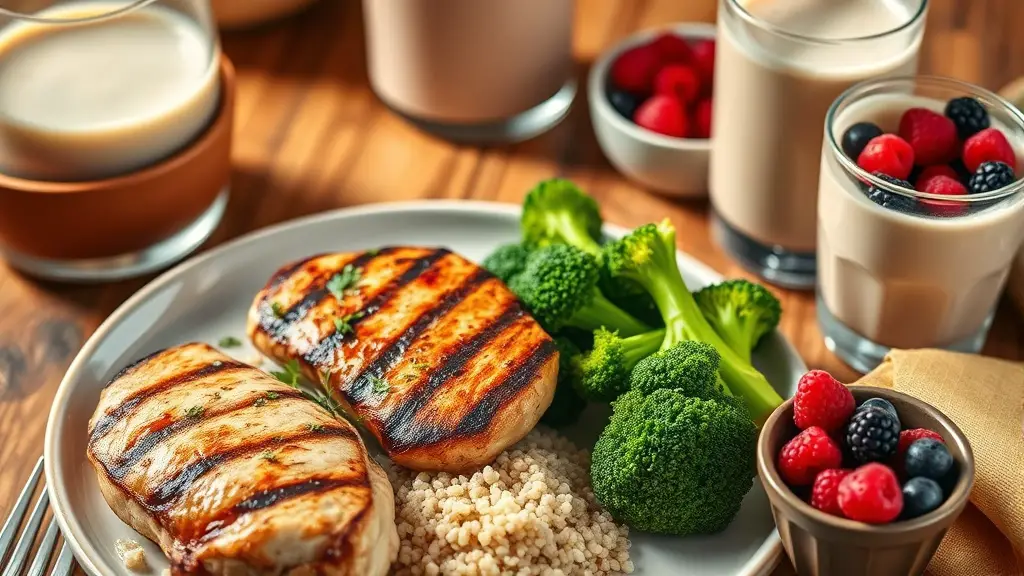
While you’ve just pushed your limits in the gym, it’s crucial to prioritize the right post-workout recovery meals to optimize muscle repair and growth. Focus on nutrient timing to guarantee your body gets the nutrients it needs right after your workout. Here are some effective food choices:
Prioritize post-workout recovery meals to enhance muscle repair and ensure your body receives essential nutrients right after exercising.
- Protein shakes: High in protein, they’re perfect for muscle repair.
- Post workout smoothies: Blend fruits, veggies, and protein for a nutrient-rich recovery drink.
- Recovery snacks: Consider options like Greek yogurt with honey or a handful of nuts.
- Meal prep: Prepare balanced meals that include carbs and protein to replenish glycogen stores. Additionally, incorporating cardiovascular fitness through activities like skipping can enhance overall recovery and muscle gain.
Importance of Hydration
Staying hydrated is essential for muscle gain, as water plays a key role in nutrient transport and muscle function. Research shows that even mild dehydration can impair your performance, making it harder to push through workouts. To optimize your muscle-building efforts, focus on timing your water intake before, during, and after your training sessions.
Role of Water Intake
Hydration plays an essential role in your muscle-gaining journey, as it directly impacts your performance and recovery. Maintaining proper water balance is critical for muscle function, nutrient transportation, and overall health. Here are some hydration tips to keep in mind:
- Drink water consistently: Aim for at least half your body weight in ounces daily.
- Monitor your urine color: Light yellow indicates proper hydration, while dark yellow suggests you need more fluids.
- Incorporate hydrating foods: Fruits and vegetables like watermelon and cucumber can boost your water intake.
- Rehydrate post-workout: Replace fluids lost during exercise to support recovery and muscle growth.
Hydration and Performance
Water intake isn’t just fundamental for health; it greatly influences your athletic performance. Proper hydration strategies can enhance performance by keeping you energized and focused. Dehydration effects, like fatigue and decreased coordination, can severely hinder your workouts, so it’s essential to monitor your water intake. Incorporating a variety of drink types, such as electrolyte-rich beverages, can help maintain electrolyte balance, especially during intense sessions. Hydration timing is important; aim to drink water before, during, and after exercise to optimize muscle recovery. Remember, even mild dehydration can impact your strength and stamina. By prioritizing hydration, you’ll not only improve performance enhancement but also support overall muscle growth and recovery.
Timing of Consumption
When planning your muscle-gaining diet, the timing of your fluid intake plays a significant role in maximizing your performance and recovery. Hydration isn’t just about drinking water; it’s about when you drink it. Here are some key points to take into account:
- Pre-workout: Drink water to guarantee ideal hydration before your workout.
- During workouts: Hydrate continuously for improved endurance and performance.
- Post-workout: Replenish fluids to support recovery and nutrient absorption.
- Meal frequency: Spread your fluid intake throughout the day to maintain hydration levels.
Sample Muscle-Gaining Meal Plan
A well-structured meal plan is essential for anyone looking to gain muscle effectively. Start your day with a breakfast that includes scrambled eggs, whole-grain toast, and a side of fruit for balanced portioning. For a mid-morning snack, opt for Greek yogurt mixed with nuts. At lunch, consider grilled chicken breast with quinoa and steamed broccoli as sample meal ideas that provide protein and complex carbs.
In the afternoon, a protein shake with a banana can keep your energy levels up. Dinner should feature salmon, sweet potatoes, and asparagus, ensuring you get healthy fats and fiber. Finally, don’t forget a pre-bedtime snack like cottage cheese with berries, which aids muscle repair overnight. Each meal should balance macronutrients to support your growth goals. Following this sample meal plan consistently can help you maximize your muscle-gaining efforts.
Frequently Asked Questions
How Do I Adjust My Diet for Bulking and Cutting Phases?
You’re not just adjusting your diet; you’re starting a culinary revolution! For bulking, you’ll need a caloric surplus, cranking up those calories while focusing on macro ratios—think protein, carbs, and healthy fats. When cutting, dial it back, reducing calories while maintaining protein to preserve muscle mass. Track your intake, adjust as needed, and remember, it’s all about fine-tuning those numbers to sculpt your physique into a masterpiece!
Can I Gain Muscle on a Vegetarian or Vegan Diet?
Yes, you can definitely gain muscle on a vegetarian or vegan diet. Focus on incorporating sufficient plant protein sources like lentils, chickpeas, and quinoa. Nutrient timing is essential; aim to consume protein-rich meals and snacks around your workouts to maximize muscle recovery and growth. Don’t forget to balance your diet with healthy fats and carbohydrates for energy. With careful planning, you can achieve your muscle-building goals while adhering to a plant-based lifestyle.
What Role Do Supplements Play in Muscle-Gaining Diets?
Supplements can play a significant role in muscle-gaining diets. For instance, protein powders offer a convenient way to meet your protein needs, especially if you’re struggling to get enough from whole foods. Creatine benefits include increased strength and improved exercise performance, which can lead to greater muscle gains over time. However, it’s essential to combine these supplements with a balanced diet and proper training for best results. Always consult a healthcare professional before starting any supplement.
How Do I Track My Food Intake Effectively?
You might think tracking food intake is tedious, but it’s essential for achieving your goals. Start with a food tracking app to simplify calorie counting. Log everything you eat, including portion sizes, to get an accurate picture of your intake. Set daily goals based on your dietary needs and adjust as necessary. Consistent tracking helps you identify patterns, making it easier to stay on course and optimize your nutrition for better results.
What Should I Do if I Hit a Plateau in Muscle Gain?
If you hit a plateau in muscle gain, it’s essential to assess your muscle recovery. Make certain you’re giving your body enough time to recuperate between workouts. Consider training adjustments, like varying your exercises or increasing intensity, to shock your muscles and stimulate growth. You might also reevaluate your nutrition and guarantee you’re consuming adequate protein. Sometimes, even a small tweak can reignite your progress and help you push past that plateau.
